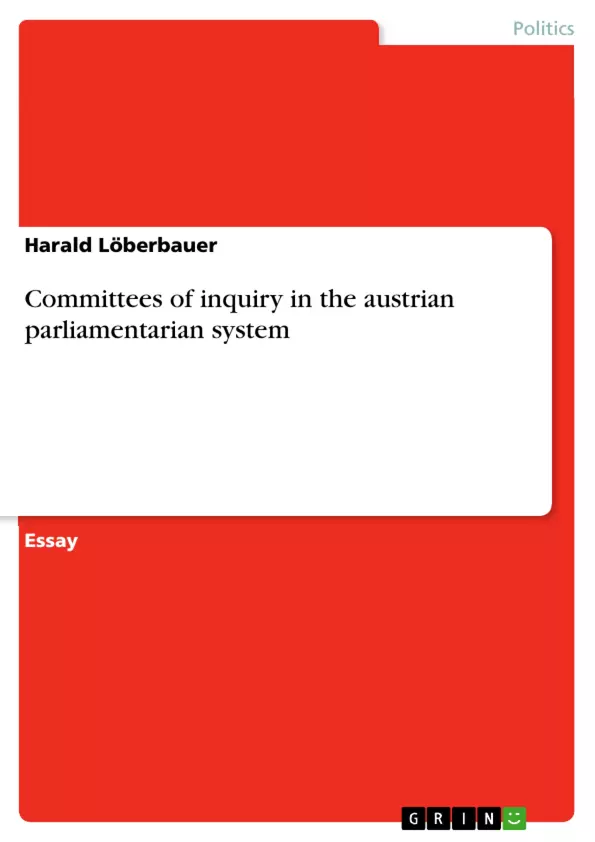... Checking the government is an essential component of the democratic principle and a central duty of most parliamentary bodies in the world. This is true for the austrian parliament as well. Legally committees of inquiry are very important in the austrian system of checking the government on special fields of interest. Parliamentarians do not depend on governmental information, but they can also acquire their own information with certain procedures. So each parliamentarian can practice fact finding on his or her own.
According to austrian law a committee of inquiry is a committee that has been adopted by the Nationalrat by majority decision. The aim of such a committee is the investigation of a special governmental activity in a special policy. Committees of inquiry are ad hoc committees. That means that they are set up only for one special purpose and that they will be terminated when the aim has been reached. It is not allowed that committees of inquiry are established without an aim and for a longer period of time than necessary. They are not designed for a constant checking the government by the parliament. Committees have to prove that the government has worked according to parliamentarian preparations and guidelines or not. The committee has to prove that the government or members of the government alone or together misused their power. After the investigation process the members of the committee of inquiry have to report to the Nationalrat. Only the Nationalrat has the power to decide what will happen to the government or a single minister. One of the instruments the parliament then can use is to prepare for a motion of no-confidence against the whole government or against one or more minister ...
Inhaltsverzeichnis (Table of Contents)
- Empiric analysis of Committees of Inquiry adopted by the austrian parliament
- Committees of inquiry in the austrian parliamentarian system
- In general, parliamentarian committees of inquiry have a positive effect on the power of the parliament according to the checking the government.
- But there are also some negative effects and I will point out two of them:
- If a committee of inquiry is established, it is very likely that it is more the role of the opposition party(ies) to be more engaged in the fact finding and investigation process.
- In the second republic of Austria there have been only 2015 committees of inquiry.
- Especially for the most recent inquiries there have been penal consequences for some government members.
- But there has not always been penal consequences for high members of the government.
Zielsetzung und Themenschwerpunkte (Objectives and Key Themes)
This document provides an empirical analysis of Committees of Inquiry in the Austrian parliamentarian system, examining their role in governmental oversight and the challenges they present. The analysis considers both the positive and negative impacts of these inquiries on the Austrian political system.
- The power of parliamentary committees of inquiry in checking the government.
- The impact of committees of inquiry on the public image of the Austrian parliament.
- The potential for political manipulation and misuse of committees of inquiry.
- The role of opposition parties in the fact-finding and investigation process.
- The consequences of inquiries for government members and the legal system.
Zusammenfassung der Kapitel (Chapter Summaries)
- This chapter introduces the concept of Committees of Inquiry in the Austrian parliamentarian system and outlines their legal framework and purpose. It emphasizes their importance in holding the government accountable and enabling parliamentarians to acquire independent information.
- This chapter explores the positive impacts of parliamentary committees of inquiry on the Austrian political system. It highlights their contribution to democratic self-purification and their role in enhancing the public image of the parliament.
- This chapter discusses the potential negative consequences of committees of inquiry. It analyzes the risk of political manipulation and the shift in the balance of power between government and opposition.
- This chapter delves into the dynamics of fact-finding and investigation within committees of inquiry. It examines the distinct roles and motivations of government and opposition parties in the process.
- This chapter analyzes the frequency of committees of inquiry in the Austrian Second Republic and explores factors influencing their establishment. It also examines the influence of government parties on the inquiry process.
- This chapter examines the consequences of committees of inquiry, particularly the penal repercussions for government members. It highlights the impact of the Lucona case on public trust and the legal system.
- This chapter explores instances where inquiries did not result in penal consequences for government members. It examines the case of Noricum and its implications for holding high-ranking officials accountable.
Schlüsselwörter (Keywords)
The main keywords and focus topics of the text include Committees of Inquiry, Austrian parliamentarian system, governmental oversight, political accountability, opposition parties, fact-finding, investigation process, public trust, legal system, Lucona case, Noricum case, and separation of powers.
Frequently Asked Questions
What is the main purpose of a committee of inquiry in Austria?
The primary purpose is the investigation of specific governmental activities to ensure accountability and to check if the government followed parliamentary guidelines.
How is a committee of inquiry established?
According to Austrian law, it is adopted by the Nationalrat (National Council) through a majority decision for a specific purpose.
Are committees of inquiry permanent bodies?
No, they are ad hoc committees, meaning they are set up for one specific purpose and are terminated once their investigation is complete.
What role do opposition parties play in these committees?
Opposition parties are typically more engaged in the fact-finding and investigation process, acting as a critical check on the governing parties.
Can these inquiries lead to penal consequences?
Yes, recent history shows that inquiries, such as the Lucona case, can lead to legal and penal repercussions for government members.
- Quote paper
- Harald Löberbauer (Author), 2006, Committees of inquiry in the austrian parliamentarian system, Munich, GRIN Verlag, https://www.grin.com/document/58630



